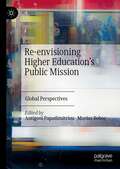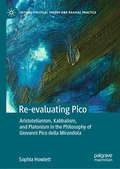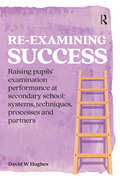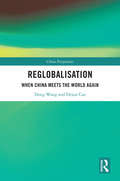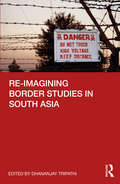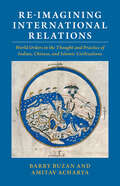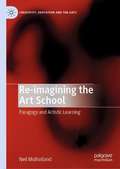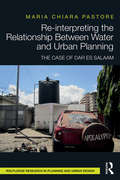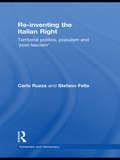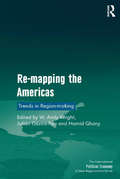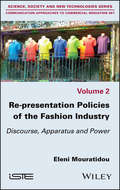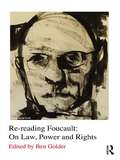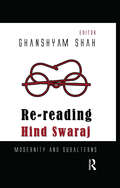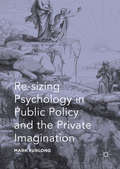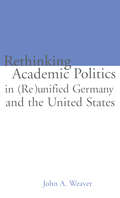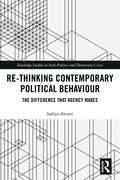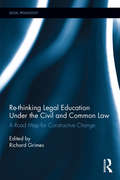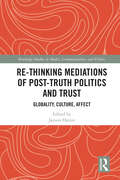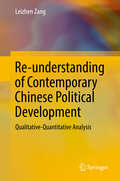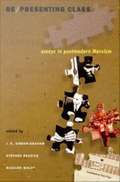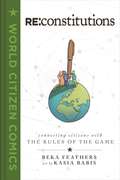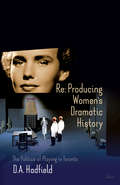- Table View
- List View
Re-envisioning Higher Education’s Public Mission: Global Perspectives
by Antigoni Papadimitriou Marius BobocThis book covers initiatives related to higher education’s public mission such as university-community engagement, knowledge transfer, economic development, and social responsibility, using empirical and conceptual cases in the US, South America, Europe, Africa, and Asia. In order to develop a better understanding of public mission initiatives in higher education across the globe, the volume editors developed a theoretical framework emerging from organizational theory. Each chapter analysis uses both external environmental elements (political, economic, sociocultural, and technological), as well as internal institutional elements (mission, vision, leadership, and governance). Finally, each chapter highlights issues related to implementation and challenges with the intent of prompting readers to consider appropriate ways in which to adopt some of the lessons learned by the contributing authors.
Re-envisioning Plastics Role in the Global Society: Perspectives on Food, Urbanization, and Environment
by Ololade OlatunjiThis book covers the challenges and opportunities presented by plastics in the modern era and sheds light on the complex interplay of technology, environment, and socio-economic dynamics. With a thorough exploration of the history, uses, and potential of plastics, the book reviews the impact of plastics beyond single-use plastics, and critiques multiple long-term plastic applications that are significant for food security, water resource management, ecological conservation/restoration, and sustainable urbanization. It also explores frameworks for achieving a more sustainable plastic economy aligned with sustainable development goals. This book comprises 13 chapters, commencing with a critical assessment of plastics in the context of sustainable development and global society. It proceeds with a historical overview of plastics' evolution, showcasing pivotal milestones and innovations in modern industry and daily life. Subsequent chapters delve into diverse topics: the intricate relationships between plastics, food security, and sustainable urbanization; plastics' impact on water safety, management, distribution, and conservation; their potential as an alternative energy source; and their innovative applications in sustainable transportation and energy generation. Emphasis is placed on plastics' role in waste reduction and recycling, as well as the latest sustainable alternatives like biodegradable and recyclable materials. In the book's final sections, readers will learn about green buildings and climate-resilient cities constructed using innovative plastic materials, and plastics' significance in space exploration. The book concludes with a forward-looking perspective on plastics' future, accompanied by recommendations for a more sustainable coexistence between society and these versatile materials. This book is a valuable resource for researchers, policymakers, industry professionals, and concerned citizens seeking to navigate the intricate landscape of plastics, their environmental implications, and their potential for sustainable development.
Re-evaluating Pico: Aristotelianism, Kabbalism, and Platonism in the Philosophy of Giovanni Pico della Mirandola (Critical Political Theory and Radical Practice)
by Sophia HowlettThis book offers a re-evaluation of Giovanni Pico della Mirandola, the prominent Italian Renaissance philosopher and prince of Concord. It argues that Pico is part of a history of attempted concordance between philosophy and theology, reason and faith. His contribution is a syncretist theological philosophy based on Christianity, Platonism, Aristotelianism and Jewish Kabbalism. After an introduction, Chapter 2 discusses Pico’s career, his power-relations and his work, Chapters 3 and 4 place his three pillars of Platonism, Aristotelianism and Kabbalism in their historical context, examines shared histories, and introduces the scholars around Pico who contributed so much in each of these traditions (introducing, for example, Christian Kabbalism), including exploring Pico's complex relationship with Marsilio Ficino. Chapter 5 examines the problems of concordance within Pico’s cosmology and metaphysics, including the question of God and the role of the Intellect. Chapter 6 describes Pico’s ‘exceptionalist’ version of the mystical ascent as an individualized ascetic experience. Pico eschews the contemporary desire to use a renewed christian thinking or christian-classical metaphysics to change the world (towards a Golden Age or a 'second coming') to present a personal path to God, with no return to the world.
Re-examining Success: Raising pupils’ examination performance at secondary school: systems, techniques, processes and partners (Practical Teaching)
by David HughesIt’s time to look at how to maximise examination success for your pupils and your school in a whole new way.While the examination performance of pupils can define a school’s success, schools have been less than systematic in preparing pupils to give their optimal performance. They focus too heavily on outcomes and too lightly on inputs to the learning process which influence performance. Whole school revision strategies, if they exist, are often curriculum knowledge based, and not designed to support and challenge individual pupils effectively.This book provides the research and practical insights required to radically review and remodel exam preparation provision with a view to ensuring more pupils, particularly those that are vulnerable, can perform to their potential. It explores recent knowledge acquisition and retention strategies, looks at reviewing pedagogical approaches across the curriculum, and addresses the need to work with pupils and parents in new ways. Most importantly it takes an ethical and mentally healthy approach to looking at effective exam preparation.Individual teachers or school leaders can use the book to enhance their current provision at a personal level, while headteachers can drive more radical change by implementing the strategies and approaches at a whole school level.
Re-forming Britain: Narratives of Modernity before Reconstruction
by Elizabeth DarlingRe-forming Britain considers the nature and practice of architectural modernism in inter-war Britain in a new light. Bringing hitherto little considered protagonists and projects to the fore, it argues that rather than being an imported idiom, the new architecture in Britain formed part of an ongoing attempt to make a modern nation. Spanning the period 1925-42, the book focuses on the key sites from and through which architectural modernism emerged in the UK. Part one considers the main arena in which a will to modernize Britain developed in the 1920s. In parts two and three the author documents, contextualizes and explains how this modernizing will was given modernist form, discussing the work of architects such as Wells Coates, Maxwell Fry, and Connell and Ward, and their allied ventures with likeminded reformers in other fields. These collaborations produced ‘narratives of modernity’: buildings, projects, exhibitions and books, through which, the book argues, modernist reformers were able to persuade politicians, and those with influence upon them, that modernism was the means to re-form the nation. Re-forming Britain offers the first in-depth analysis of well-known modernist schemes such as Kensal House and the Pioneer Health Centre but also brings previously little studied or unknown activities to light. This important work invites a new understanding of the nature of architectural modernism in inter-war Britain and the ways in which it ultimately gave form to post-war Britain.
Re-globalisation: When China Meets the World Again (China Perspectives)
by Wang Dong Dejun CaoSince the end of the Cold War, globalisation has been the dominant political and economic trend. But what is China’s role in globalisation? What is China’s vision of the world? This title offers a fresh and stimulating account of how China's involvement in globalisation has changed over time, and how its role in leading the “re-globalisation” process is profoundly reshaping the world. Introducing an innovative theoretical framework in the shape of “re-globalisation”, this book discusses China’s strategies and challenges while interacting with the international community. The book provides several illuminating case studies, such as the Belt and Road Initiative (BRI), the Asian Infrastructure Investment Bank (AIIB), and the strategies of the Chinese technology firm Alibaba. Rich in data and bold in argument, the book provides an extraordinarily dynamic depiction of how China’s encounter with the outside world has not only transformed itself, but also reshaped the global order. As the first systemic and book-length study of “re-globalisation”, this volume will appeal to researchers and students of politics and Chinese studies, and contemporary Chinese politics in particular.
Re-imagining Border Studies in South Asia
by Dhananjay TripathiThis book presents a radical rethinking of Border Studies. Framing the discipline beyond conventional topics of spatiality and territoriality, it presents a distinctly South Asian perspective – a post-colonial and post-partition region where most borders were drawn with political motives, ignoring the socio-cultural realities of the region and economic necessities of the people. The authors argue that while securing borders is an essential function of the state, in this interconnected world, crossing borders and border cooperation is also necessary. The book examines contemporaneous and topical themes like disputes of identity and nationhood, the impact of social media on Border Studies, trans-border cooperation, water-sharing between countries, and resolution of border problems in the age of liberalisation and globalisation. It also suggests ways of enhancing cross-border economic cooperation and connectivity, and reviews security issues from a new perspective. Well supplemented with case studies, the book will serve as an indispensable text for scholars and researchers of Border Studies, military and strategic studies, international relations, geopolitics, and South Asian studies. It will also be of great interest to think tanks and government agencies, especially those dealing with foreign relations.
Re-imagining Hate Crime: Transphobia, Visibility and Victimisation (Palgrave Hate Studies)
by Ben ColliverThis book draws upon empirical data to offer a fresh and unique perspective on hate crime victimisation, using transphobic hate crime as a case study. It adopts the lens of ‘visibility’ as a way of understanding hate crime victimisation and to challenge dominant theoretical and conceptual perspectives of hate crime. In adopting this lens, key aspects of victimisation are explored, including the hierarchical nature of hate crime victimisation that afford visibility to particular types of victimisation and to particular groups of people to make them ‘legitimate’ victims. In challenging these notions, this book highlights the pervasive, everyday nature of much hate crime and introduces the concept of ‘micro-crimes’ as a way to conceptualise the nature of victimisation that is often overshadowed by discussions around ‘microaggressions’ and more socially recognisable forms of ‘hate crime’. Key ideas relating to space, place and identity performance are drawn upon throughout these analyses and discussions to provide a nuanced overview and conceptualisation of hate crime victimisation.
Re-imagining International Relations: World Orders in the Thought and Practice of Indian, Chinese, and Islamic Civilizations
by Barry Buzan Amitav AcharyaBuzan and Acharya challenge the discipline of International Relations to reimagine itself in the light of the thinking about, and practice of, international relations and world order from premodern India, China and the Islamic world. This prequel to their 2019 book, The Making of Global International Relations, takes the story back from the two-century tale of modern IR, to reveal the deep global history of the discipline. It shows the multiple origins and meanings of many concepts thought of as only modern and Western. It opens pathways for the rest of the world into this most Eurocentric of disciplines, encouraging them to bring their own histories, concepts and theories with them. The authors have written this book with the hope of inspiring others to extend these pathways by bringing in a wider array of cultures, and exploring how they thought about and acted in worlds composed of multiple, independent, collective actors.
Re-imagining the Art School: Paragogy and Artistic Learning (Creativity, Education and the Arts)
by Neil MulhollandThis book proposes ‘paragogic’ methods to re-imagine the art academy. While art schooling was revolutionised in the early 20th century by the Bauhaus, the author argues that many art schools are unwittingly recycling the same modernist pedagogical fashions. Stagnating in such traditions, today’s art schools are blind to recent advances in the scholarship of teaching and learning. As discipline-based education research in art eternally battles the perceived threat of epistemicide, transformative educational practices are rapidly overcoming the perennialism of the art school. The author develops critical case studies of open source and peer-to-peer methods for re-imagining the art academy (para-academia) and andragogy (paragogy). This innovative book will be of interest and value to students and scholars of the art school, as well as how the art academy can be reimagined and rebuilt.
Re-interpreting the Relationship Between Water and Urban Planning: The Case of Dar es Salaam
by Maria Chiara PastoreAfrica is one of the most dynamic continents. It will play a key role in the coming decades in relation to the growth of cities, and environmental conditions will be of primary importance. The structural lack of water and sanitation infrastructure affects the development of Africa's growing urban environments. This book questions the relation between the wide-ranging fields of water and the urban discipline in the Sub-Saharan African context. In particular, it focuses on Dar es Salaam (Tanzania), a city where rapid urbanisation and high annual growth have led to increasing water demand and strained the water and sanitation systems. It examines the spaces water produces, the actors promoting various choices and solutions, the impact of different applied technologies, and the diverse sanitary conditions, focusing on their significance in the shape of the built environment and the urban planning practices and theory. As water occupies and creates spaces, this work tries to establish a relation among the spaces and the structure of the city itself, using infrastructure in the shape of networks that cross the city and on-site systems such as boreholes and latrines, to be considered a hybrid and potentially resilient system.
Re-inventing the Italian Right: Territorial politics, populism and 'post-fascism' (Extremism and Democracy)
by Stefano Fella Carlo RuzzaFollowing his third election victory in 2008, the Italian Prime Minister Silvio Berlusconi was the most controversial head of government in the EU. This is a cogent examination of the Berlusconi phenomenon, exploring the success and development of the new populist right-wing coalition in Italy since the collapse of the post-war party system in the early 1990s. Carlo Ruzza and Stefano Fella provide a comprehensive discussion of the three main parties of the Italian right: Berlusconi’s Forza Italia, the xenophobic and regionalist populist Northern League and the post-fascist National Alliance. The book assesses the implications of this controversial right for the Italian democratic system and examines how the social and political peculiarities of Italy have allowed such political formations to emerge and enjoy repeated electoral success. Framed in a comparative perspective, the authors: explore the nature of the Italian right in the context of right-wing parties and populist phenomena elsewhere in other advanced democracies, drawing comparisons and providing broader explanations. locate the parties of the Italian right within the existing theoretical conceptions of right-wing and populist parties, utilising a multi-method approach, including a content analysis of party programmes. highlight the importance of political and discursive opportunities in explaining the success of the Italian right, and the agency role of a political leadership that has skilfully shaped and communicated an ideological package to exploit these opportunities. Providing an excellent insight into a key European nation, this work provides a thoughtful and stimulating contribution to the research on the Italian right, and its implications for democratic politics.
Re-mapping the Americas: Trends in Region-making (The International Political Economy of New Regionalisms Series)
by W. Andy Knight Julián Castro-Rea Hamid GhanySince the end of the Second World War the map of the Americas has changed dramatically. Not only were many former European colonies turned into sovereign states, there was also an ongoing process of region-making recognizable throughout the hemisphere and obvious through the establishment of several regional agreements. The emergence of political and economic regional integration blocs is a very timely topic analyzed by scholars in many disciplines worldwide. This book looks at remapping the recent trends in region-making throughout the Americas in a way that hasn’t been at the center of academic analyses so far. While examining these regionalisation tendencies with a historical background in mind, the authors also answer fundamental questions such as: What influences does globalization have on region-making, both on normative regionalism plans as well as on actual economic, political, cultural, military and social regionalization processes driven by state and non-state actors? What ideas or interests lead states in the Americas to cooperate or compete with one another and how is this power distributed? How do these regional agreements affect trade relations and have there been trade barriers set up to protect national economies? What agreements exist or have existed and how did they change with regard to contents and for what reason? The book informs academic as well as non-academic audiences about regional developments in the Americas, in particular those dating back to the last twenty years. Beyond the primary purpose of summarizing the hemisphere’s recent trends, the book also brings clarification in a detailed but easy to understand way about timely issues regarding the institutionalisation, or lack thereof, of the plethora of regional and sub-regional bodies that have emerged in this hemisphere over the past couple of decades.
Re-presentation Policies of the Fashion Industry: Discourse, Apparatus and Power
by Eleni MouratidouThe book studies the way the luxurious fashion develops re-presentational politics by reinvesting symbolic fields such as art and culture, religion and the sacred as well as politics, in other words fields that represent a certain common pattern of life and a common interest. I develop a semiotic approach of the way art exhibitions, print and audiovisual advertising, publishing and distribution politics as well as special ready to wear collaborations with arts such as Jeff Koons reveal the fashion industry's gesture of pretending being a non-commercial structure especially in order to cover up its industrialisation and banalization process
Re-reading Foucault: On Law, Power And Rights
by Ben GolderLaw, Rights and Power: Re-Reading Foucault is the first collection in English to fully address the relevance of Foucault’s thought for law. Michel Foucault is the best known and most cited of the late twentieth-century’s ‘theory’ academics. His work continues to animate a range of different critical work across intellectual disciplines in the arts, humanities and social sciences. There has, however, been relatively little examination of the legal implications and applications of Foucault’s work. This book fills that gap, providing an in-depth analysis of Foucault’s thought as it pertains to the crucial questions of law, government and rights. This collection engages with key legal themes as they emerge, both in Foucault’s work and in the contemporary scholarship that surrounds it. These include: the opposition between ‘law’ and ‘the juridical’; legal ways of organising and processing knowledge; sovereignty; punishment; bio-politics and governmentality; security; resistance; and, judgment. Including contributions from acknowledged experts on Foucault’s work, as well as pieces by younger scholars, Law, Rights and Power: Re-Reading Foucault will be of considerable interest across a range of disciplines, including law, sociology, criminology, international relations, political theory, and philosophy.
Re-reading Hind Swaraj: Modernity and Subalterns
by Ghanshyam ShahMahatma Gandhi, one of the greatest global icons of all times, is known as much for his successful leadership of India’s non-violent anti-colonial freedom movement as for his virtue and simplicity. His ideals have inspired diverse social and political movements across the world: against apartheid in South Africa, racial segregation in the United States, several state policies and actions in India and nuclear weaponisation, and for environmental sustainability and world peace. Hence, a pertinent question is often raised by media and academia: How would Gandhi have responded to the contemporary Indian and global situation marked by ethnic conflicts, terrorism, economic insecurity under the dominance of a global neo-liberal economic order and moral degeneration in private and public lives? Addressing this question in this volume through critical and variant re-readings of Hind Swaraj (1909), his key manifesto of socio-political transformation, social scientists, political philosophers and social activists seek to establish a social and academic dialogue with Gandhi, interrogating his thoughts, values and vision, and examining their relevance to present-day problems. In spotlight is a contentious issue: the relationship between modernity and emancipation of subalterns, in the light of his critique of modern civilisation, the central thesis of the text.This book will be of interest to those in Gandhian studies, political science, history, philosophy, sociology, development studies, as well as activists, policy makers and the lay reader.
Re-sizing Psychology in Public Policy and the Private Imagination
by Mark FurlongThis book interrogates the current reputation of Psychology, both as an industry and as part of the academy. It disputes Psychology's claim to be a science, questions its claims to effectiveness and examines relationships with other disciplines and fields. Just as Psychology's role in the design of addictive gaming machines has been underplayed so too has the conservative aspect of its regulation of normality and pathology. The discipline of Psychology affects our understanding of identity and subjectivity to position the self as amoral and disconnected. This book questions this assumption and, more generally, the received status of Psychology.
Re-thinking Academic Politics in: Comparative Academic Politics & the Case of East German Historians (Studies in Education/Politics)
by John A. WeaverFirst Published in 2001. Routledge is an imprint of Taylor & Francis, an informa company.
Re-thinking Contemporary Political Behaviour: The Difference that Agency Makes (Routledge Studies in Anti-Politics and Democratic Crisis)
by Sadiya AkramProposing a novel approach to understanding the contemporary political landscape, Akram draws on the work of Pierre Bourdieu and Margaret Archer on agency and argues the need for an in-depth engagement with concepts of agency to improve the reach and scope of political analysis. Is the way that people engage with politics changing? If so, how well-equipped are we to document and explain the extent and range of the ways in which people are engaging in politics today? This book tackles these questions through a blend of theoretical reflection and empirical research, shedding new light on the relationship between arena and process definitions of politics, and how the social relates to the political. Hitherto unexplored features of agency such as the unconscious and the internal political conversation are shown to be critical in exploring how people mobilise today and how they make sense of their political engagement. Two in-depth case studies of the internal political conversations that individuals hold as well as an analysis of the 2011 UK riots are presented. Making a case for the role of self-expression in politics, this book will be of use for graduates and scholars interested in British politics, political theory, social theory, political sociology, the theory and practice of political engagement and political behaviour.
Re-thinking Legal Education under the Civil and Common Law: A Road Map for Constructive Change (Legal Pedagogy)
by Richard GrimesWhilst educational theory has developed significantly in recent years, much of the law curriculum remains content-driven and delivered traditionally, predominantly through lecture format. Students are, in the main, treated as empty vessels to be filled by the eminent academics of the day. Re-thinking Legal Education under the Common and Civil Law draws on the experience of teachers, practitioners and students across the world who are committed to developing a more effective learning process. Little attention has, historically, been paid to the importance of the application of theory, the role of reflective learning, the understanding and acquisition of lawyering skills and the development of professional responsibility and wider ethical values. With contributions from across the global north and south, this book examines the history of educating our lawyers, the influences and constraints that may shape the curriculum, the means of delivering it and the models that could be used to tackle current shortcomings. The whole is intended to represent what might be desirable and possible if we are to produce lawyers that are fit for purpose in the 21st century, be that in either in civil or common law jurisdictions. This book will be of direct assistance to those who wish to understand the theory and practice of legal pedagogy in an experiential context. It will be essential reading for academics, researchers and teachers in the fields of law and education, particularly those concerned with curriculum design and developing interactive teaching methods. It is likely to be of interest to law students too – particularly those who value a more direct engagement in their learning.
Re-thinking Mediations of Post-truth Politics and Trust: Globality, Culture, Affect (Routledge Studies in Media, Communication, and Politics)
by Jayson HarsinThis collection reaches beyond fake news and propaganda, misinformation, and charismatic liars, to explore the lesser-publicized cultural forms and practices that serve as a cultural infrastructure for post-truth society and politics. Situating post-truth in specific contexts as a site of contestation or crisis, the book critically explores it as a dynamic and shifting site around which political and cultural practices in specific contexts revolve and overlap. Through a breadth of perspectives, the volume considers a number of overlapping cultural and political developments across varying national and transnational contexts: changing technologies and practices of cultural production that sometimes shift and at other times reproduce authority of traditional institutional truth-tellers; seismic cultural changes in representations, values, and roles regarding gender, sexuality, race, and historical memory about them, as well as corresponding reactionary discourses in the "culture wars"; questions of authenticity, honesty, and power relations that combine many of the former shifts within an all-encompassing culture of (self-)promotional, attentional capitalism. These considerations lead scholars to focus on corresponding shifting cultural dynamics of popular truth-telling and (dis-)trust-making that inform political culture. In this more global view, post-truth becomes foremost an influentially anxious public mood about the struggles to secure or undermine publicly accepted facts. This nuanced and insightful collection will interest scholars and students of communication studies, media and cultural studies, media ethics, journalism, media literacy, sociology, anthropology, philosophy, and politics.
Re-understanding of Contemporary Chinese Political Development: Qualitative-quantitative Analysis
by Leizhen ZangThis book provides the solid and detailed evidence for some debated theories in Chinese studies, based on quantitative-qualitative analysis or mixed methods, which is quite novel compared with the extant work through qualitative or quantitative research alone. In addition, the country's latest particular political phenomena, such as anti-corruption campaigns in the Xi Jinping era or career satisfaction of graduate village officials, have been carefully studied. What’s more, the current situation of political development and participation in the Internet era is fully discussed from a comparative historical perspective. Such examples as the cybereconomy of Chinese rural areas together with the regional differentiation of voting behaviors between rural and urban areas are the focus of investigation. Meanwhile, the legitimacy and characteristics of China’s governance, and government reforms along with the adaptability of foreign theories are also illustrated in this book.
Re/Presenting Class: Essays in Postmodern Marxism
by J. K. Gibson-Graham Stephen Resnick Richard D. WolffRe/presenting Class is a collection of essays that develops a poststructuralist Marxian conception of class in order to theorize the complex contemporary economic terrain. Both building upon and reconsidering a tradition that Stephen Resnick and Richard Wolff--two of this volume's editors--began in the late 1980s with their groundbreaking work Knowledge and Class, contributors aim to correct previous research that has largely failed to place class as a central theme in economic analysis. Suggesting the possibility of a new politics of the economy, the collection as a whole focuses on the diversity and contingency of economic relations and processes. Investigating a wide range of cases, the essays illuminate, for instance, the organizational and cultural means by which unmeasured surpluses--labor that occurs outside the formal workplace, such as domestic work--are distributed and put to use. Editors Resnick and Wolff, along with J. K. Gibson-Graham, bring theoretical essays together with those that apply their vision to topics ranging from the Iranian Revolution to sharecropping in the Mississippi Delta to the struggle over the ownership of teaching materials at a liberal arts college. Rather than understanding class as an element of an overarching capitalist social structure, the contributors--from radical and cultural economists to social scientists--define class in terms of diverse and ongoing processes of producing, appropriating, and distributing surplus labor and view class identities as multiple, changing, and interacting with other aspects of identity in contingent and unpredictable ways. Re/presenting Class will appeal primarily to scholars of Marxism and political economy. Contributors. Carole Biewener, Anjan Chakrabarti, Stephen Cullenberg, Fred Curtis, Satyananda Gabriel, J. K. Gibson-Graham, Serap Kayatekin, Bruce Norton, Phillip O'Neill, Stephen Resnick, David Ruccio, Dean Saitta, Andriana Vlachou, Richard Wolff
Re: Connecting Citizens with the Rules of the Game (World Citizen Comics)
by Beka FeathersThe next volume in the World Citizen Comics series, Re: Constitutions explains the role constitutions play in how government is structured and provides context for the modern issues that arise from these documents.Marcus is stumped by a summer assignment: to write an essay on what it means to be a citizen. He’s surprised to hear from people in his community that constitutions play an important role when it comes to citizenship—they can even affect whether you feel like you belong in your country or not. From a Kosovo Albanian neighbor to a Rwandan exchange student, and even in his own family history, Marcus discovers stories of how constitutions—including the U.S. Constitution—shape the political landscape and our daily lives.From Beka Feathers, an expert in post-conflict institution building, and Kasia Babis, an accomplished political cartoonist, comes a graphic novel that gives context to the modern issues that arise from constitutions. With historical examples from all over the world, Re: Constitutions examines how this essential document defines a nation’s identity and the rights of its citizens.
Re: Producing Women's Dramatic History
by D. A. HadfieldWithin the last generation, Canadian drama, like other literary forms, has seen the emergence of works by women that re-vision the role of women in history. However, in order to write themselves into theatre history, women have had to negotiate a complex journey through both pages and stages, a network of public production that is highly politically charged at every turn. This book examines the strategies employed by seven feminist productions that have managed to achieve a canonic place in the recorded history of Canadian theatre. All of the plays under consideration here exist (or have existed) in at least one published script form. However, Dorothy Hadfield’s purpose here is not to analyze these scripts for the definitive meaning of the narratives in these plays, nor is she trying to suggest how a reader or audience should inevitably read them. Instead, Hadfield is trying to account for how and why these scripts came to exist in published form, given the strong implicit connection between publication and a public assumption of "good” or "successful” theatre. In a system where textual visibility leads to opportunities for study, reproduction and validation for both play and playwright, the permanence of script publication can have real economic and ideological advantages. By analyzing publicity materials, photos, programs, reviews, box office and theatre records, it is possible to trace the process of creating a theatrical "success,” as well as to assess what effect that critical verdict has on the shape of the script publications of these works. In effect, by placing the textual artifacts left behind by these performances in the context of their production and reception, in part through a carefully constructed ideological compatibility throughout the production process, it is possible to investigate how the politics of the theatrical process influences what we perceive as "good” playwriting.
